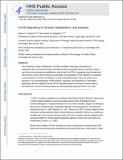mTOR Signaling in Growth, Metabolism, and Disease
Author(s)
Saxton, Robert Andrew; Sabatini, David
Downloadnihms850540.pdf (1.159Mb)
PUBLISHER_CC
Publisher with Creative Commons License
Creative Commons Attribution
Terms of use
Metadata
Show full item recordAbstract
© 2017 Elsevier Inc. The mechanistic target of rapamycin (mTOR) coordinates eukaryotic cell growth and metabolism with environmental inputs, including nutrients and growth factors. Extensive research over the past two decades has established a central role for mTOR in regulating many fundamental cell processes, from protein synthesis to autophagy, and deregulated mTOR signaling is implicated in the progression of cancer and diabetes, as well as the aging process. Here, we review recent advances in our understanding of mTOR function, regulation, and importance in mammalian physiology. We also highlight how the mTOR signaling network contributes to human disease and discuss the current and future prospects for therapeutically targeting mTOR in the clinic.
Date issued
2017-03Department
Massachusetts Institute of Technology. Department of Biology; Koch Institute for Integrative Cancer Research at MITJournal
Cell
Publisher
Elsevier
Citation
Saxton, Robert A., and David M. Sabatini. “mTOR Signaling in Growth, Metabolism, and Disease.” Cell 168, 6 (March 2017): 960–976 © 2017 Elsevier Inc
Version: Author's final manuscript
ISSN
0092-8674
1097-4172